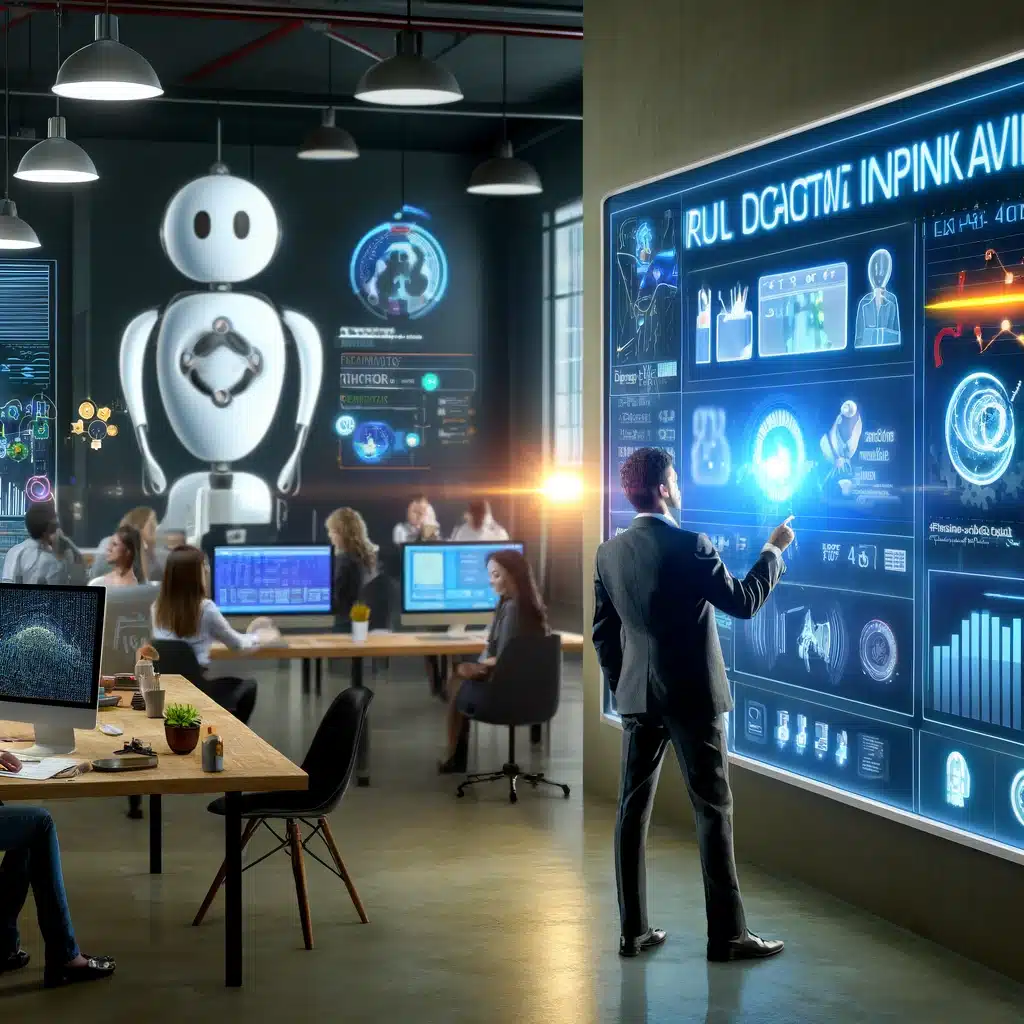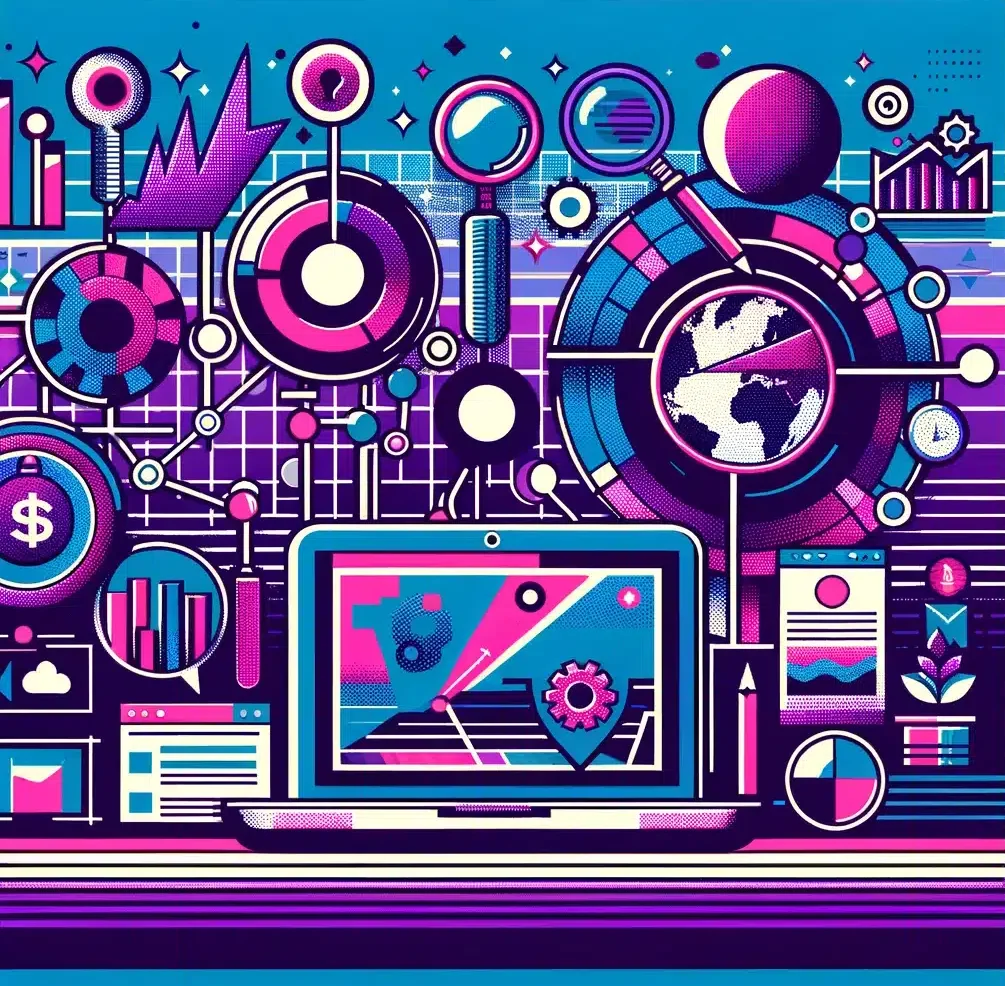Artificial Intelligence (AI) has been shaping various industries since its inception in the 1950s, with its first application in the form of the Logic Theorist program in 1956. AI has become increasingly prominent in digital marketing in recent years, revolutionizing how businesses connect with their audiences. However, despite its growing influence, AI’s rapid advancements have also triggered doubts, fears and thoughts about the potential consequences of relying too heavily on automated systems. This blog post explores the current impact of AI in digital marketing, provides tangible examples of AI tools, and highlights the ongoing need for agency support.
The Current Capabilities of AI and Digital Marketing
News for you: AI is not new!
AI has been powering some tools and platforms for a while but has made significant strides in recent years, providing numerous benefits across various aspects of digital marketing. Here are some key areas where AI is currently making a substantial impact:
1. Personalization and Customer Segmentation
AI-driven algorithms analyze vast amounts of data to deliver personalized experiences to users. By understanding customer behaviour and preferences, AI can segment audiences more accurately, ensuring that marketing messages are tailored to individual needs and interests. This level of personalization enhances customer engagement and increases conversion rates.
Examples of Tools:
- Dynamic Yield (founded in 2011): Utilizes machine learning to deliver personalized content, product recommendations, and targeted offers.
- Segment (founded in 2011): Aggregates customer data from various sources to create comprehensive customer profiles for better segmentation.
AI Inception: Personalization and customer segmentation using AI started gaining traction in the early 2010s with machine learning and data analytics advancements.
Downside: While this significantly advances in targeting, we can also note that the customization has limits. A user interested in a particular product or service might have to consume content even if they already made the purchase/service hire. People wanting more information about a topic get served with related content for a while. What does that translate into? Platforms constantly present internet users with content they might not want to see anymore, but AI is struggling to leave them to carry on their online journey. In terms of marketing, it also translates into two folds:
- Content can still be presented while the user’s intent has moved on.
- AI struggles to highlight opportunities within context, meaning that while some users might have been interested at some point, they might not be interested now, while others might be. Still, the signals AI focuses on have not been updated, and AI ignores the context. It is not rare to see digital marketing campaigns going well and declining slowly because the audience bucket has moved on or evolved.
2. Predictive Analytics
AI enables predictive analytics, allowing marketers to anticipate future trends and consumer behaviour. AI can forecast sales, identify potential leads, and optimize marketing strategies by analyzing historical data. Predictive analytics helps businesses stay ahead of the competition and make informed decisions.
Examples of Tools:
- HubSpot (AI features introduced in 2017): Offers predictive lead scoring and forecasting to prioritize high-potential leads.
- IBM Watson Analytics (launched in 2014): Provides advanced data analysis and predictive insights to inform marketing strategies.
AI Inception: Predictive analytics has been around for decades, but its application in digital marketing took off in the mid-2010s with the rise of big data and advanced machine learning algorithms.
While those predictions are based on existing data, it also means that staying ahead of the competition is difficult. Not only does the AI tool need a fair amount of signals to predict, but it does not take into account potential changes in legislation or consumer behaviour and upcoming trends, especially on new platforms or new products.
3. Chatbots and Customer Support
AI-powered chatbots have become essential tools for customer support. They provide instant responses to queries, handle routine tasks, and offer 24/7 assistance. Chatbots improve customer satisfaction by providing quick and efficient service, allowing human agents to focus on more complex issues.
Examples of Tools:
- Drift (founded in 2015): Provides conversational marketing and sales chatbots for real-time customer engagement.
- Intercom (AI features introduced in 2018): Offers chatbots that automate customer support and lead qualification.
AI Inception: AI-driven chatbots started becoming mainstream around 2015, with significant improvements in natural language processing (NLP) technologies.
Chatbots have improved drastically in the last few years. It is not uncommon nowadays to have a chat with a bot who sometimes can help you. However, this can be an issue when there is no way to talk to a human. Depending on the complexity of the request and the user’s knowledge, internet users prefer and request a human touch. When a website fails to deliver, users can feel frustrated and feel the company they are trying to engage with is not customer-centric and would move on to another one that can cater to their needs.
4. Content Creation and Curation
AI can generate content, such as blog posts, social media updates, and product descriptions, with remarkable efficiency. Natural Language Processing (NLP) algorithms can produce human-like text, saving time and resources. Additionally, AI can curate content by analyzing user preferences and recommending relevant articles, videos, and products.
Examples of Tools:
- Copy.ai (founded in 2020): Utilizes GPT-3 to create various types of written content.
- Curata (founded in 2007): Uses AI to curate and recommend relevant content based on user interests.
AI Inception: AI for content creation and curation gained significant momentum in the late 2010s when the development of advanced NLP models like GPT-2 and GPT-3 took place.
I must admit, this is probably the most significant change in the digital marketing landscape—for both content creation and content translation—as the results are pretty good. Not only does it help to create content from scratch with different tones of voice and styles, but it is also clever enough now to engage with translation—or content written from scratch in the target language.
5. Ad Targeting and Optimization
AI enhances ad targeting by analyzing user data and behaviour patterns to deliver more relevant ads to specific audiences. AI-powered platforms like Google Ads and Facebook Ads optimize ad campaigns in real-time, adjusting bids and targeting parameters to maximize ROI. This precision targeting ensures that you spend marketing budgets more effectively.
Examples of Tools:
- Google Ads (AI features introduced in the mid-2010s): Uses machine learning to optimize ad placements, bids, and targeting.
- Facebook Ads (AI features introduced in the mid-2010s): Employs AI to improve ad relevance and performance through dynamic creative optimization and audience targeting.
AI Inception: AI-driven ad targeting and optimization have been integral to digital advertising platforms since the mid-2010s, and AI capabilities have continuously improved.
This is probably the trickiest part. While ad targeting and optimization have made massive progress, the AI algorithm has yet to be fully disclosed. You will see some recommendations from the tool that allow you to increase your performance. You will see others that can make you spend quite a lot of money…. with very little return on investment. We can also see that seasonality is based on the previous year, not on the month ahead, and does not consider a query’s current growth or decline.
As for the intent, to understand at which stage of sales a user might be, some tools can give you some clues, but digital advertising platforms don’t. This is the main current issue, in my opinion, when you are running lead generation campaigns. Quite a lot of work needs to happen before running them, and the keywords used can all trigger online conversions, but deal closing will vary drastically depending on their position on the sales ladder. Tracking each campaign and keywords can help you refine the conversions and help you develop lead nurturing funnels.
AI and Digital Marketing: Why You Still Need Support from an Agency
While AI offers numerous advantages, the expertise and strategic insight of a digital marketing agency remain crucial for several reasons:
1. Strategic Planning and Creativity
AI excels at data analysis and automation but requires more creativity and strategic thinking for comprehensive marketing plans. Agencies bring a wealth of experience, creativity, and industry knowledge to develop innovative campaigns that resonate with audiences. They understand the nuances of brand identity, market trends, and consumer psychology, ensuring that marketing efforts are aligned with business goals.
Examples:
- Developing unique campaign themes and creative concepts.
- Crafting engaging and emotionally resonant ad copy.
Bearing in mind that AI bases its results on previous data, it might come back with some very basic or overused ideas. It will take the most successful ads for some time, considering best practices, but it still lacks fine-tuning up-trending ideas and out-of-the-box thinking.
2. Human Touch and Emotional Intelligence
AI can process data but cannot replicate the emotional intelligence and human touch necessary for building strong customer relationships. Agencies excel at crafting emotionally resonant messages and experiences that foster genuine connections with customers. They understand the importance of empathy and cultural sensitivity in marketing, which AI cannot fully grasp.
Examples:
- Personalizing customer interactions based on cultural contexts.
- Responding empathetically to customer concerns and feedback.
If you have studied psychology, you will understand that emotional triggers are the most effective. Unfortunately, while AI can pretend to be empathetic, it still has a long way to go, as humans are far too complicated!
3. Complex Problem Solving
Digital marketing often involves complex challenges that require human problem-solving skills. Agencies can navigate unexpected issues, adapt strategies in real time, and provide personalized solutions based on a deep understanding of the client’s business. They offer flexibility and adaptability that AI alone cannot achieve.
Examples:
- Addressing sudden changes in market conditions.
- Developing contingency plans for campaign adjustments.
While AI bases its answers on past data, your marketing strategy needs to adapt to sudden changes in market conditions in a timely manner. Intuition coupled with experience are the two main skills AI still needs to master.
4. Integration and Coordination between Ai and Digital Marketing
A successful digital marketing strategy requires seamless integration and coordination of various elements, including content creation, social media management, SEO, PPC, and more. Agencies have the expertise to manage these components cohesively, ensuring a unified approach that maximizes results. They also stay updated with industry trends and technologies, continuously refining strategies for optimal performance.
Examples:
- Coordinating multi-channel campaigns for consistent brand messaging.
- Leveraging the latest tools and platforms for maximum impact.
Again, while AI can provide a good framework for digital marketing, it has its limits: understanding a brand and its positioning is still something AI can’t help with.
Conclusion
AI has undoubtedly transformed the digital marketing landscape, offering powerful tools and capabilities that enhance efficiency and effectiveness. It’s essential to recognize that AI has been a part of digital marketing for a while, integrated into platforms like Google, LinkedIn, Facebook, and more. These platforms use AI to optimize ad placements, personalize user experiences, and analyze large datasets for better decision-making.
However, AI still needs to replace digital marketing agencies. Instead, AI and agencies are highly complementary. Digital marketing cannot perform at its best without AI. However, AI cannot replace the human touch, creativity, and strategic insight agencies provide. By combining the strengths of AI with the expertise of a digital marketing agency, businesses can achieve remarkable results. They can also stay ahead in an increasingly competitive market. Digital marketing agencies are now in a prime position to help customers with lower fees while educating them on digital marketing strategies, tactics and ideas.
At Aeolus Digital, we leverage the best of both worlds to deliver exceptional marketing solutions tailored to your unique needs at lower costs. Contact us to learn how we can help you navigate the dynamic digital marketing landscape with confidence.




Start the conversation